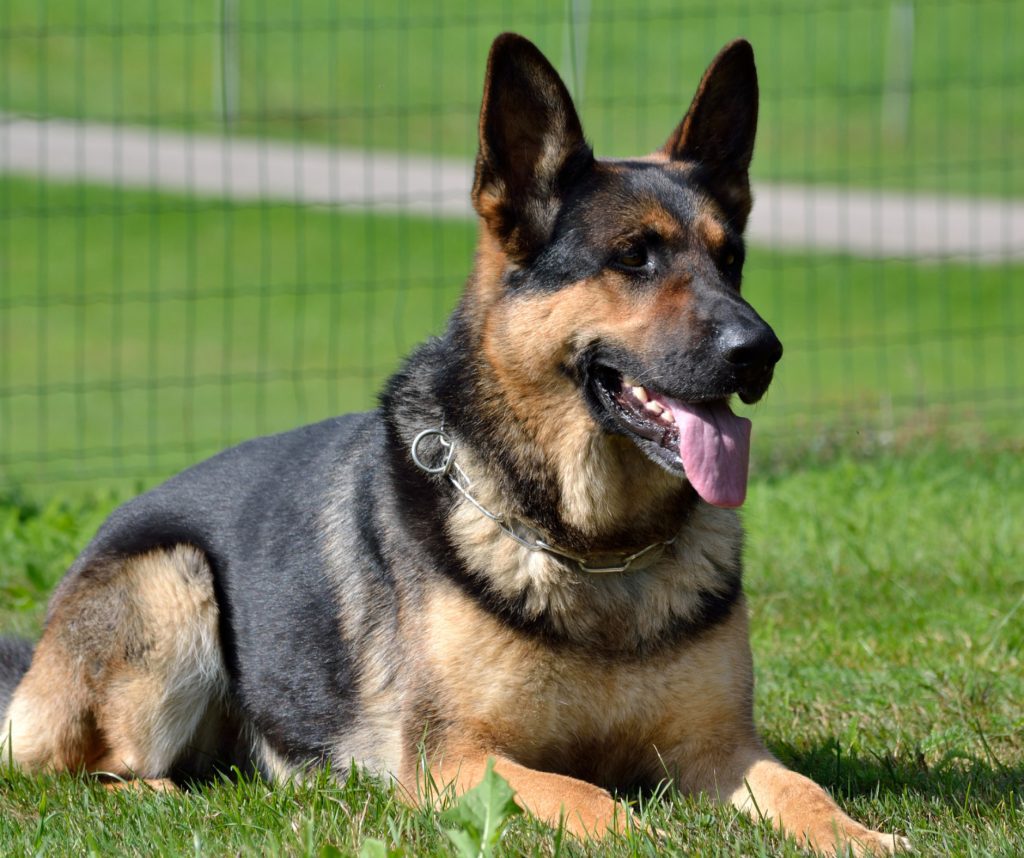German Shepherds are one of the most popular dog breeds in the world, and for good reason. They are known for their loyalty, intelligence, and versatility. However, one trait that many German Shepherd owners have noticed is stubbornness. The question is, are German Shepherds stubborn?

Understanding German Shepherds’ behavior is key to answering this question. German Shepherds were originally bred to be working dogs, which means they have a strong work ethic and a desire to please their owners. However, this also means that they can become bored and restless if they are not given enough mental and physical stimulation. This can lead to behaviors that some people may perceive as stubbornness.
The stubbornness trait in German Shepherds is not unique to this breed. Many dogs can exhibit stubborn behavior, but it is important to understand why a dog is behaving in a certain way before labeling it as stubborn. There are many factors that can influence a dog’s behavior, including genetics, training, and environment. By understanding these factors, owners can develop strategies to manage stubborn behavior in their German Shepherds.
Key Takeaways
- German Shepherds can exhibit stubborn behavior, but it is important to understand why a dog is behaving in a certain way before labeling it as stubborn.
- Factors that can influence a dog’s behavior include genetics, training, and environment.
- By understanding these factors, owners can develop strategies to manage stubborn behavior in their German Shepherds.
Understanding German Shepherds’ Behavior
German Shepherds are known for their intelligence, loyalty, and protective nature. However, they can also be stubborn at times, which can make training them challenging. To understand why German Shepherds can be stubborn, it’s important to understand their behavior.
Independent Nature
German Shepherds have a strong sense of independence, which means they need to know that they are in charge. This trait can make them more likely to resist commands or act in a disobedient manner. However, this independence also makes them great problem solvers and quick learners.
High Energy Levels
German Shepherds are a high-energy breed that needs plenty of exercise and mental stimulation to stay healthy and happy. When they don’t get enough exercise or mental stimulation, they can become bored and destructive. This can lead to stubborn behavior, as they may be more interested in exploring their surroundings than obeying commands.
Lack of Proper Training
Another reason why German Shepherds can be stubborn is a lack of proper training. Without consistent and effective training, they may not understand what is expected of them. This can lead to confusion and frustration, which can manifest as stubborn behavior.
Fear and Anxiety
German Shepherds are known for their protective nature, which can make them wary of new people and situations. If they feel threatened or anxious, they may become stubborn and refuse to obey commands. It’s important to socialize German Shepherds from a young age to prevent fear and anxiety-related behavior problems.
The Stubbornness Trait in German Shepherds

German Shepherds are known for their intelligence, loyalty, and strength. However, they are also known for their stubbornness. This trait can make training them a bit challenging, especially if the owner is not experienced in dog training.
According to GermanShepherdsOwner.com, one reason why German Shepherds can be stubborn is due to their independent nature. They are independent thinkers and may not respond well to harsh or heavy-handed training methods. Instead, positive reinforcement strategies that reward good behavior are more effective.
Another reason for their stubbornness is boredom. German Shepherds are highly active dogs that require a lot of physical and mental stimulation. If they do not get enough exercise or mental stimulation, they can become bored and stubborn. To prevent this, owners should provide plenty of exercise and mental stimulation, such as puzzle toys or obedience training.
It is also essential to consider the dog’s diet.A poor diet can affect the dog’s behavior. If the dog is being stubborn, it could be due to something the owner is feeding it. Therefore, owners should ensure that their German Shepherds are getting the right nutrients and not being fed anything that could be causing stubbornness.
Factors Influencing Stubbornness in German Shepherds

German Shepherds are a highly intelligent breed, but they can also be quite stubborn. Understanding the factors that influence stubbornness in German Shepherds can help owners develop effective training strategies to address this behavior.
Genetics
Genetics play a significant role in a German Shepherd’s temperament and behavior. Some German Shepherds may be more prone to stubbornness due to their breeding. For example, dogs bred for work may be more focused and less likely to exhibit stubborn behavior, while dogs bred for show may be more independent and headstrong.
Training
Training is another significant factor that can influence a German Shepherd’s stubbornness. A lack of consistent and effective training can lead to stubborn behavior. German Shepherds require regular mental and physical stimulation to prevent boredom, which can lead to stubbornness. Positive reinforcement training techniques that reward good behavior can help reduce stubborn behavior in German Shepherds.
Environment
The environment in which a German Shepherd lives can also influence their stubbornness. A lack of exercise or mental stimulation can lead to boredom, which can cause a dog to exhibit stubborn behavior. A stressful or chaotic environment can also contribute to stubborn behavior.
In conclusion, genetics, training, and environment are all factors that can influence a German Shepherd’s stubbornness. By understanding these factors, owners can develop effective training strategies to address stubborn behavior in their dogs.
Strategies to Manage Stubborn Behavior
German Shepherds are known for their intelligence and independence, which can sometimes lead to stubborn behavior. However, with the right strategies and consistent training, it is possible to manage this behavior effectively.
Positive Reinforcement
One effective strategy for managing stubborn behavior in German Shepherds is to use positive reinforcement. This involves rewarding good behavior with treats, praise, or other rewards. Positive reinforcement can help reinforce good behavior and encourage your dog to continue behaving well.
Consistent Training
Consistent training is also crucial when managing stubborn behavior in German Shepherds. Dogs thrive on routine and consistency, so it is important to establish a consistent training schedule and stick to it. This can help your dog understand what is expected of them and reinforce good behavior over time.
Professional Help
In some cases, professional help may be necessary to manage stubborn behavior in German Shepherds. A professional dog trainer or behaviorist can help identify the underlying causes of your dog’s stubborn behavior and develop a customized training plan to address it. They can also provide guidance and support as you work to manage your dog’s behavior.
Common Misconceptions About German Shepherds’ Stubbornness

German Shepherds are often thought to be stubborn dogs, but this is not entirely true. It is a common misconception that all German Shepherds are stubborn, but it is important to understand that each dog is unique and has its own personality. While some German Shepherds may be more stubborn than others, it is not a characteristic that is inherent to the breed.
One of the reasons why German Shepherds are sometimes perceived as stubborn is because of their high intelligence. They are independent thinkers and may not respond well to harsh or heavy-handed training methods. However, this does not mean that they are inherently stubborn. With proper training and socialization, German Shepherds can be obedient and well-behaved dogs.
Another misconception about German Shepherds’ stubbornness is that it is a result of their breeding. While German Shepherds were originally bred as working dogs and have a strong work ethic, this does not necessarily translate to stubbornness. In fact, their strong work ethic can actually make them more responsive to training and commands.
It is also important to note that a lack of training and socialization can contribute to a dog’s perceived stubbornness. If a German Shepherd is not properly trained and socialized, they may exhibit stubborn behavior as a result of confusion or anxiety.
Conclusion

In conclusion, German Shepherds can be stubborn at times, but it’s important to understand that it’s not always their fault. Sometimes, it’s due to a lack of proper training or unclear commands from their owners. Other times, it may just be a part of their personality and breed traits.
It’s crucial to use positive reinforcement techniques when training a German Shepherd, as punishment may only lead to more stubborn behavior. Consistency is also key, as German Shepherds thrive on routine and structure.
Frequently Asked Questions
What are some effective training methods for German Shepherds?
German Shepherds are intelligent and independent, which can make training challenging. However, positive reinforcement training methods have been found to be effective with this breed. Rewarding good behavior with treats or praise can encourage your German Shepherd to repeat the desired behavior. Consistency and patience are key when training a German Shepherd.
How do you handle a German Shepherd that refuses to obey commands?
If your German Shepherd is refusing to obey commands, it’s important to first rule out any medical issues that may be causing the behavior. If there are no underlying health problems, it may be necessary to modify your training approach. Try breaking down commands into smaller steps and rewarding your dog for each step. It’s important to remain calm and patient, as frustration or anger can exacerbate the problem.
What are some common behavior problems seen in German Shepherds?
German Shepherds can be prone to certain behavior problems, including separation anxiety, aggression, and destructive chewing. These issues can often be addressed through training and environmental modifications. Providing plenty of exercise and mental stimulation can also help prevent behavior problems from developing.
What are some tips for dealing with a stubborn German Shepherd puppy?
Puppies can be especially challenging to train, and German Shepherds are no exception. It’s important to establish yourself as the pack leader early on, and to be consistent with your training methods. Positive reinforcement training, such as clicker training, can be effective with puppies. It’s also important to provide plenty of opportunities for socialization and play.
How do German Shepherds respond to positive reinforcement training?
German Shepherds generally respond well to positive reinforcement training, as they enjoy pleasing their owners and are motivated by rewards. Using treats, praise, and playtime as rewards can encourage your German Shepherd to repeat desired behaviors. Consistency and patience are key when using positive reinforcement training.
What are some ways to establish yourself as the alpha with a strong-willed German Shepherd?
Establishing yourself as the pack leader is important when dealing with a strong-willed German Shepherd. This can be achieved through consistent training, setting clear boundaries, and being confident and assertive in your interactions with your dog. It’s important to avoid using physical punishment or aggression, as this can exacerbate behavior problems. Instead, focus on positive reinforcement and consistent training to establish a strong bond with your German Shepherd.











































